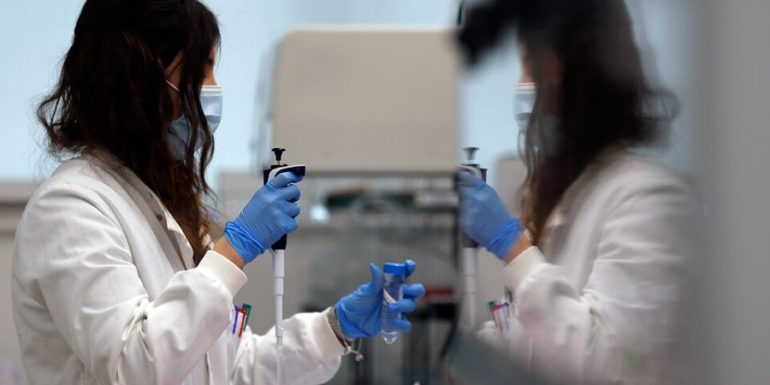The news two weeks ago that a new "super" variant of the coronavirus was identified in Cyprus, which was christened Deltacron because it combined the Delta and Omicron variants, sparked global concern. Ultimately, scientists tend to conclude that there has never been such a hyper-variation and that its alleged detection through genetic analysis was either a scientific error or the whole issue was misinterpreted and "inflated" too much for no reason.
It all started on January 7, when a distinguished scientist, the virologist Leontios Kostrikis, Professor of Biological Sciences at the University of Cyprus, a founding member of the Cyprus Academy of Letters and Arts and head of the Laboratory of Biotechnology, announced that the samples of individuals with coronavirus, several genomes of the virus that combined elements from both the Delta and the new Omicron variant. He and his colleagues named their finding Deltacron and "uploaded" the analyzes of dozens of such genomes to the GISAID database.
A day later, on January 8, the international media broke the news and Deltacron became world news. The subsequent reaction of the international scientific community, however, was extremely cautious to negative. The general impression was that it was not a dreaded genetic recombination of two variants of the virus, but rather a contamination of the samples in the laboratory.
"There is no such thing as #Deltacron. "#Omicron and #Delta did NOT create a super variant", wrote on Twitter Dr. Kroutika Koupali, a member of the World Health Organization team for Covid-19, based at the Medical University of South Carolina, USA.
According to the leading scientific journal "Nature", which devoted an article to the case and the scientific controversy that erupted, some researchers are satisfied that the scientific system quickly found a possible genetic sequencing error, while others warn that the fact is a typical example of how misinformation can spread in the midst of a pandemic.
Kostrikis says some aspects of his original case have been misinterpreted and that - despite Deltacron's confusion as some media outlets thought it was a new recombinant Delta-Omicron virus - he never said it was a hybrid of of two variants. In any case, 72 hours after the initial publication, he removed the disputed sequences from their common view in the genetic database.
Cheryl Bennett of the GISAID Foundation in Washington said that as more than seven million SARS-CoV-2 coronavirus genes were "loaded" into the database from January 2020 to January 2022, some errors should come as no surprise. As he put it, "the rush to draw conclusions based on data that has just been made available by laboratories, which are under considerable time pressure to produce data on time, does not help an epidemic."
Deltacron genetic sequences were analyzed from samples taken by L. Kostrikis's laboratory in December as part of genomic surveillance of coronavirus variants in Cyprus. The researchers then noticed in some sequences of the virus genome a "signature" reminiscent of Omicron in the gene of the spike protein with which the virus enters human cells.
As the Cypriot scientist told "Nature", his initial assumption was that some virus particles of the Delta variant had independently displayed mutations similar to those common in Omicron. But then, after the international uproar erupted, other scientists, such as Jeremy Camille, a virologist at Louisiana State University, suggested something else as an alternative: a laboratory error.
Kostrikis counters that if Deltacron was a product of contamination of the samples, the genetic sequencing would have shown sequences of the Omicron variant with Delta-type mutations, the presentation of any solid evidence that this is something real ".
On the other hand, other researchers claim that even if the samples were not infected in the laboratory, the mutations detected by Kostrikis do not exclusively concern Omicron, but are found in other variants. According to virologist Thomas Pickock of Imperial College London, the GISAID database is spread across genome sequences that contain elements found in other variants of the virus. But, as he says, "people do not need to overthrow them, because there is not so much grief of the international press around them."
Kostrikis said he was already "in the process of exploring all the crucial views expressed by prominent scientists around the world on my recent announcement" and plans to submit his research for publication in a peer-reviewed journal.
Meanwhile, other scientists fear that the Deltacron incident may make researchers more reluctant to share their data. As Camille put it, "We need to allow the scientific community to self-correct. "And in a pandemic we have to facilitate the rapid exchange of data on the viral genome, because in this way we find the new variants."
Source: RES-EAP
